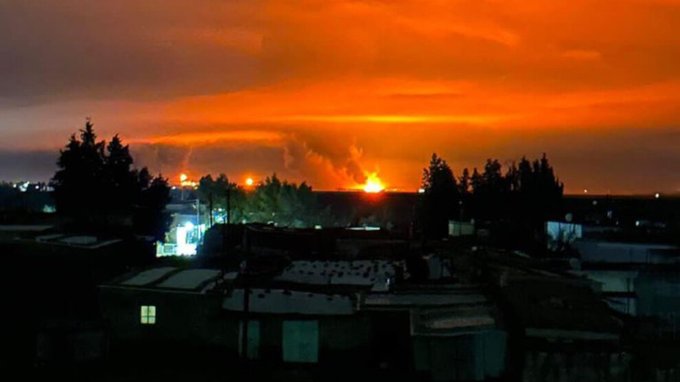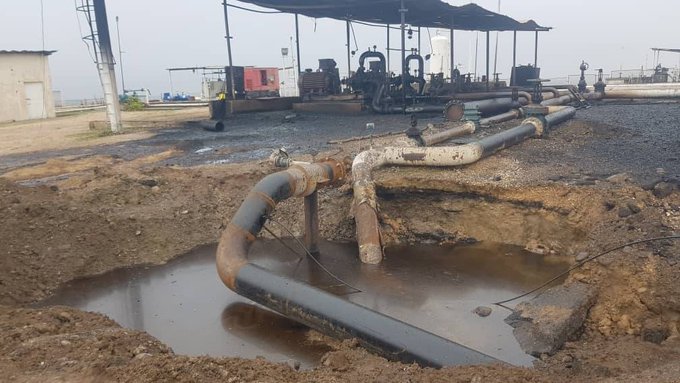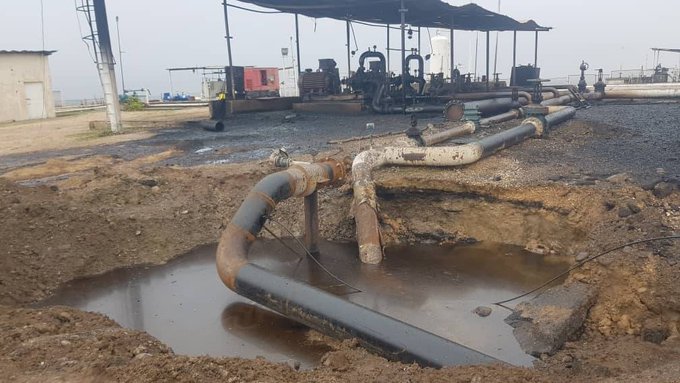Since the night of December the 23rd, the Turkish State is carrying out a new wave of attacks against the Autonomous Administration of North and East Syria. It again commits numerous war crimes by attacking and killing civilians, destroying infrastructure and health institutions. They are directly destroying the basis of life and existence of the people.
On the nights of the 23rd and 24th December, an oil station and oil field near Tirbespî were bombed and the infrastructure was heavily damaged, inducing severe air pollution due to fire on crude oil, eventually leading to contaminate soil and water across large areas.
An electricity production site was bombed in Bana Şikeftê, Koçerata region near the town of Dêrik. As a result of the blackout, gas pumps of another nearby electricity power plant, Siwediyê became nonoperational. As its electricity production, which provides energy for surrounding areas, was reduced by half, and due to the blackout of Bana Şikeftê, Ewda petrol station in Tirbespî also became nonoperational. There are electricity shortages in the areas of Dêrik, Tirbespî and Çilaxa. Another indirect effect is an increased difficulty in access to water where electrical water pumps are used.
On the morning of the 25th December, ten airstrikes hit the city of Qamişlo, targeting centres for agriculture, press printing, construction and a sewing factory. In these attacks, at least eight people lost their lives and nine others were wounded. Also on the 25th, an olive oil factory and a lentil factory were bombed in Amûdê. Kobanê also experienced airstrikes on medical and economic centres. On the 26th December there was a strike on a wheat warehouse in Girke Legê, The attacks are ongoing and reports are non-exhaustive.


The different waves of airstrikes, the last of which occurred in October, are only a shift in the intensity of the warfare. North and East of Syria is facing war every day through embargo, ecocide (especially on the lands of Afrîn), water privation (rivers drying up due to upstream dams and water usage in the Turkish state), and the attacks of the mercenaries it (Turkey) backs.
This destruction on economy and vital infrastructures for services aims at stopping the Revolution and the realisation of its social and ecological aspirations. The Autonomous Administration is implementing social and economic policies that strives toward sustainability. But these efforts are being hindered by the war, as most efforts are drained in repair and maintenance of the most essential infrastructure constantly damaged by the war. Also, the embargo blocks essential material for maintaining and further developing the infrastructures that would set up a more decentralised and ecological system. Along with these limitations, many basic needs are dependant on oil usage, as the region was developed for oil extraction in pre-revolutionary times. For example, oil-backed technologies are the only way of producing electricity or heating for most of the population. Due to the embargo, oil extractions infrastructure will have to be used in a damaged state with increased detrimental impact on people’s health and environment.


Destruction of the infrastructure and economic facilities will affect the social-ecological situation in the short and long term. The destruction of electricity power plants will have severe effects on the water supply, since all the water being used in the region is pumped from the ground. This affects the agriculture and reforestation programs in a harsh way and therefore not only the self-sustainability of the region, but also the struggle against desertification. Economic self-sustainability would allow the development of an economy outside of the exploitation and destruction of nature. To create such an economy, based on cooperatives and collective production, peace and a functioning infrastructure are basic conditions.
The Autonomous Administration creates a model of ecological economy and therefore is one of the most important actors against the ecological destruction in the region. In order to stop the war and overcome the obstacles of the revolution’s ecological development, we call for international solidarity and for awareness to be raised on the situation.

